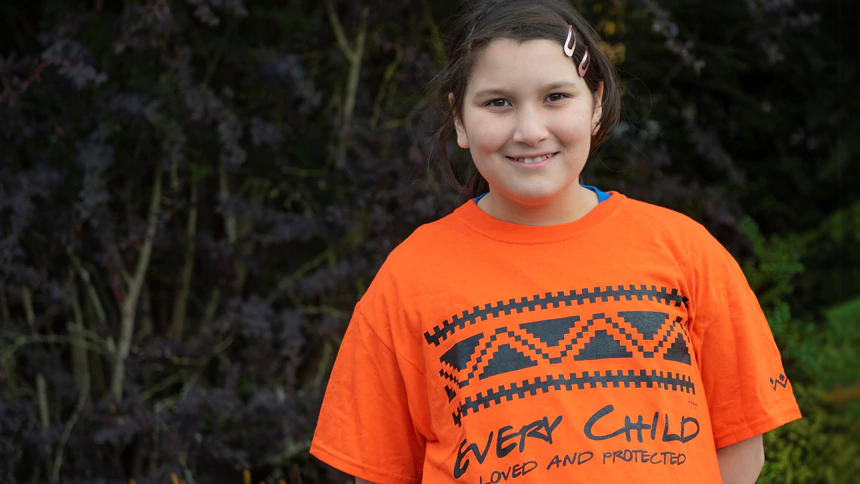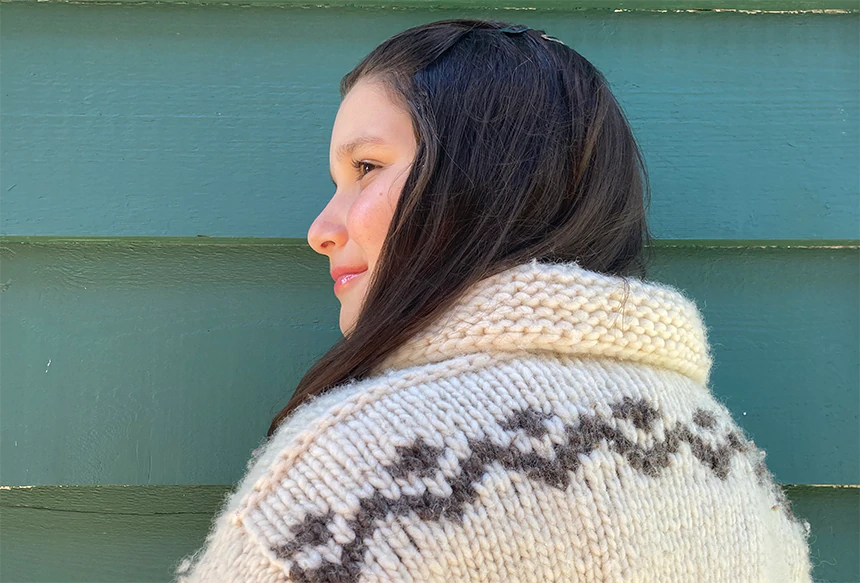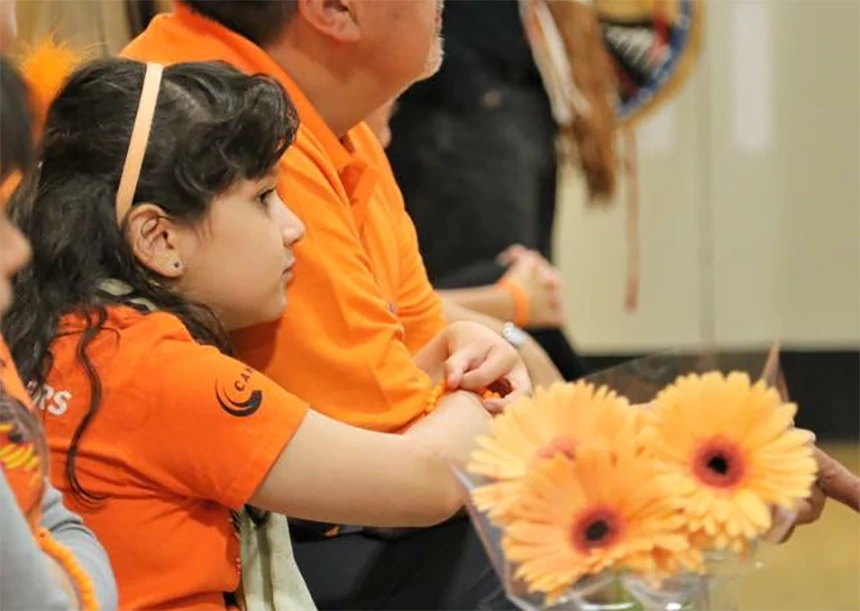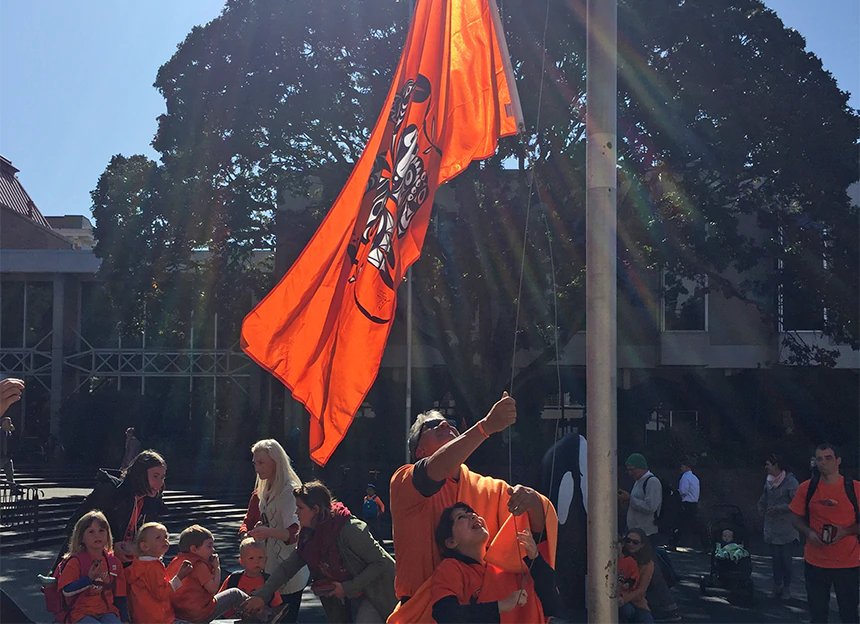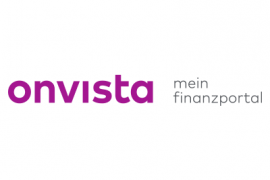Haley Paetkau has already raised $5,000 this year
When 11-year-old Haley Paetkau was in Grade 3, she was surprised to learn that her school didn’t have an Orange Shirt Day.
She asked her mom whether she should speak up about it.
“I was like, should I start this? Can I do this? I feel like we’re learning on the land of Indigenous people, we should learn why, and honour the land we’re learning on.”
Turns out, she could.
For the third year in a row, Haley is organizing Orange Shirt Day at St. Michaels University School on Vancouver Island.
The annual event, which takes place on Sept. 30, is meant to help kids understand the harmful impact that Canada’s residential school system had on Indigenous people.
Making the day a part of her school calendar was important to Haley because she comes from a family of residential school survivors, including her dad.
That means they survived their experiences at the schools. Unfortunately, for others, that wasn’t always the case.

Haley and her dad speaking at an Orange Shirt Day event in Victoria in 2018. Her dad, Steve Sxwithul’txw, was forced to attend Kuper Island Residential School when he was a kid. (Image submitted by Jean Paetkau)
What were residential schools?
Between 1831 and 1996, thousands of Indigenous kids were taken from their communities and sent to boarding schools called residential schools.
The schools were funded by the Canadian government and run by Christian churches or provincial governments.
The schools attempted to strip kids away from their Indigenous culture, and they were not allowed to speak their own languages.
Haley wears a sweater knitted by her grandmother who is a residential school survivor. Haley is a member of the Penelakut Tribe, a nation off the east coast of Vancouver Island. (Image submitted by Jean Paetkau)
Many kids were abused at these schools, and an estimated 6,000 kids died because they were sick or starved.
The story behind Orange Shirt Day
Orange Shirt Day was started in 2013 by residential school survivor Phyllis Webstad, who went to a residential school in Williams Lake, British Columbia.
The day is named after an experience she had on her first day of school when she was just six years old.
She arrived wearing a new orange shirt that her grandmother had bought her, but school staff stripped it from her.
The event takes place on Sept. 30 every year because it’s the day that many Indigenous children were forced to leave their homes.
People wear orange shirts to honour Phyllis Webstad and to create awareness around what residential schools did to Indigenous people.
3 years of fundraising
Once Haley learned what her family members and other survivors went through, she wanted to make sure other kids knew what happened, too.
“This needs to be recognized, people need to learn what happened. They can’t just say, well, that was in the past, we can forget about it. Because the past is important.”
After getting her school on board, Haley organized her first Orange Shirt Day in Grade 4, raising $1,200 by selling hundreds of homemade bracelets that she made with her family and friends.
In 2018, the money Haley raised selling bracelets was used to buy books for Penelakut Island Elementary School on Penelakut Island, B.C. (Image submitted by Jean Paetkau)
In Grade 5, she raised $1,800 that was used to send students at Stz’uminus Community School in Ladysmith, B.C., on a cultural exchange to learn about First Nations tribes.
Although COVID-19 has complicated things this year, Haley is continuing to raise funds by selling orange shirts at her school while practising physical distancing.
She had already raised about $5,000 before the day even arrived.
That money will be going to Qwam Qwum Stuwixwulh Community School in Nanaimo, B.C.
A ‘wave of orange’
Haley said she really felt the impact of her efforts during last year’s Orange Shirt Day events.
“I stood in front of the assembly in front of this wave of orange, and it made me feel like people do care and people are raising awareness.”
Last year, Haley was invited to raise the Orange Shirt Day flag with her dad at a City of Victoria Orange Shirt Day event. (Image submitted by Jean Paetkau)
Haley said that by helping other students understand the past, she hopes they can create a better future together.
“I hope they learn from the Indigenous perspective what happened and why this was not OK, and how we can change the present and try to make a better future.”
When asked what more Canadian kids can do outside of Orange Shirt Day, Haley said it’s important to find ways to restore and uplift Indigenous culture.
“I’ve always noticed that there has been a lack of Indigenous language classes. I feel like there should be more because residential schools really took away the language; there aren’t a lot of fluent speakers anymore.”
Want to learn more about the word Indigenous? Watch below.

Devoted web advocate. Bacon scholar. Internet lover. Passionate twitteraholic. Unable to type with boxing gloves on. Lifelong beer fanatic.

